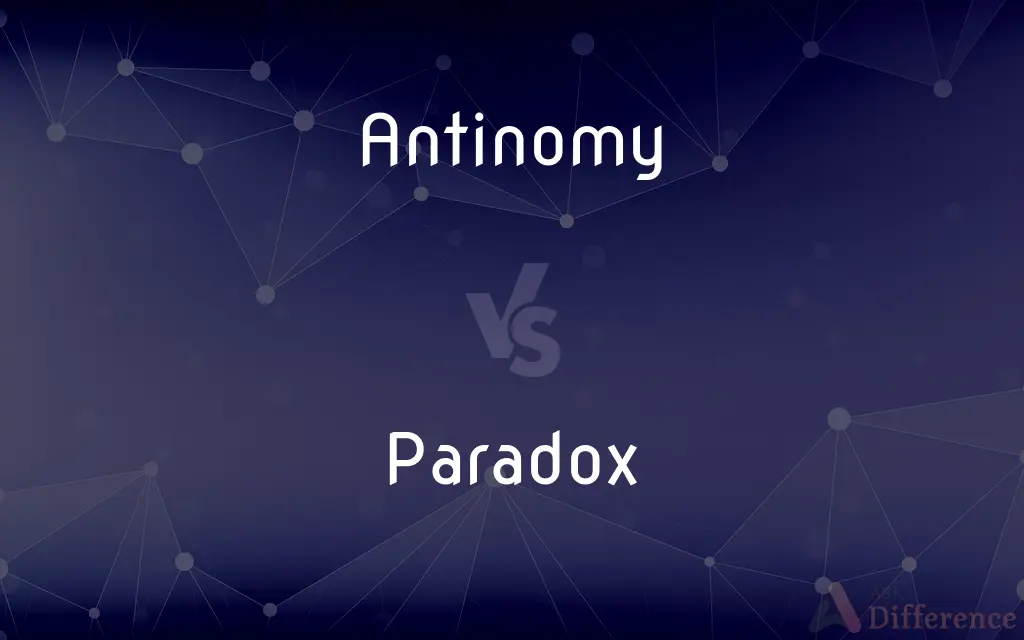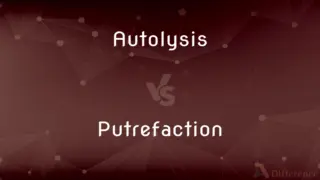Antinomy vs. Paradox — What's the Difference?
By Tayyaba Rehman & Maham Liaqat — Updated on March 26, 2024
Antinomy refers to a real or apparent mutual contradiction between two laws or principles, while a paradox is a statement that contradicts itself but might reveal a deeper truth.

Difference Between Antinomy and Paradox
Table of Contents
ADVERTISEMENT
Key Differences
Antinomies are conflicts between principles or laws that seem equally rational, valid, or necessary, yet are in direct opposition to each other when applied to certain cases. They often arise in philosophy and logic, highlighting limitations or conflicts within systems of thought or belief. On the other hand, paradoxes are statements, propositions, or situations that despite seemingly sound reasoning from acceptable premises, lead to a conclusion that seems senseless, logically unacceptable, or self-contradictory.
Antinomies require a framework of laws or principles within which the contradiction occurs, implying a structural or systemic conflict. This characteristic often makes antinomies particularly relevant in formal disciplines like mathematics, law, and metaphysics, where foundational principles must be rigorously applied and consistent. Paradoxes, while they may also appear in formal contexts, often have a broader application, including rhetorical or illustrative uses that challenge conventional wisdom or encourage deeper inquiry without necessarily being rooted in a formal system of thought.
The resolution of antinomies often involves a critical examination or revision of the underlying principles or the framework in which they operate, potentially leading to significant philosophical or theoretical advancements. For example, Kant’s antinomies in the "Critique of Pure Reason" challenge the reader to reconsider the nature of space, time, and infinity, leading to profound insights into the limits of human knowledge and understanding. Paradoxes, by contrast, may not always be solvable in a traditional sense but can serve as important tools for highlighting the limitations of human reasoning, the complexity of language, or the depth of philosophical problems.
Antinomies and paradoxes both play crucial roles in the advancement of knowledge and the deepening of philosophical inquiry. While antinomies point to conflicts within systems that demand resolution or reconceptualization, paradoxes can illuminate the unexpected consequences of seemingly straightforward reasoning or assumptions. Both encourage a more nuanced and sophisticated understanding of the world, though they do so through different mechanisms and with different implications for thought and action.
The distinction between antinomies and paradoxes is also important for understanding the nature of logic and reasoning. Antinomies challenge us to refine our systems of thought to accommodate or resolve contradictions, while paradoxes remind us of the inherent limitations and surprises in our attempts to understand and describe reality. Both are essential for a full appreciation of the complexities involved in reasoning about the world, but they engage with these complexities in distinct and complementary ways.
ADVERTISEMENT
Comparison Chart
Definition
A contradiction between two seemingly valid principles or laws.
A statement or situation that contradicts itself or defies intuition.
Context
Often arises in formal systems like law, logic, and philosophy.
Found across various domains, including literature, science, and rhetoric.
Purpose
Highlights conflicts within a theoretical or logical framework.
Provokes thought or illustrates a deeper truth despite seeming contradiction.
Resolution
May require reevaluation or modification of the underlying framework.
Often remains unresolved, serving to illuminate limitations or complexities.
Example
Kant's antinomies, which explore contradictions in concepts like space and time.
The liar paradox, where a statement that declares itself false creates a contradiction.
Compare with Definitions
Antinomy
A conflict between two equally strong principles or laws that cannot be simultaneously true.
Kant's antinomy of pure reason posits that the universe is both finite and infinite.
Paradox
A situation or statement that defies intuition or common sense.
The paradox of thrift suggests that saving more leads to a decrease in economic well-being.
Antinomy
A theoretical contradiction in a system of thought.
The physicist pondered the antinomy inherent in quantum mechanics and general relativity.
Paradox
A statement that contradicts itself but might contain a truth.
The paradox This statement is false challenges our understanding of truth.
Antinomy
A philosophical term indicating a contradiction in the applicable laws or principles.
The antinomy between free will and determinism continues to puzzle philosophers.
Paradox
A rhetorical device used to illustrate an unexpected insight.
Deep down, you're really shallow is a paradox that critiques superficiality.
Antinomy
A legal term for a contradiction between two laws that makes a case undecidable.
The antinomy in the statutes left the judges in a quandary.
Paradox
A concept or proposition that despite sound reasoning from acceptable premises, leads to a conclusion that seems logically unacceptable.
The barber paradox, where a man shaves all and only those men who do not shave themselves.
Antinomy
A situation where two rules or principles lead to opposite conclusions.
The environmental policy presented an antinomy between economic growth and conservation.
Paradox
An anomaly or oddity that cannot be easily explained.
The paradox of choice argues that more options can lead to less satisfaction.
Antinomy
Antinomy (Greek ἀντί, antí, "against, in opposition to", and νόμος, nómos, "law") refers to a real or apparent mutual incompatibility of two laws. It is a term used in logic and epistemology, particularly in the philosophy of Kant.
Paradox
A paradox is a logically self-contradictory statement or a statement that runs contrary to one's expectation. It is a statement that, despite apparently valid reasoning from true premises, leads to a seemingly self-contradictory or a logically unacceptable conclusion.
Antinomy
Contradiction or opposition, especially between two laws or rules.
Paradox
A seemingly absurd or contradictory statement or proposition which when investigated may prove to be well founded or true
The uncertainty principle leads to all sorts of paradoxes, like the particles being in two places at once
Antinomy
A contradiction between principles or conclusions that seem equally necessary and reasonable; a paradox.
Paradox
A statement that seems to contradict itself but may nonetheless be true
The paradox that standing is more tiring than walking.
Antinomy
(archaic) A contradiction within a law, or between different laws; also, a contradiction between authorities.
Paradox
A person, thing, or situation that exhibits inexplicable or contradictory aspects
"The silence of midnight, to speak truly, though apparently a paradox, rung in my ears" (Mary Shelley).
Antinomy
(by extension) Any contradiction or paradox.
Paradox
A statement that is self-contradictory or logically untenable, though based on a valid deduction from acceptable premises.
Antinomy
In the thought of the German philosopher Immanuel Kant (1724–1804): an apparent contradiction between valid conclusions; a paradox.
Paradox
An apparently self-contradictory statement, which can only be true if it is false, and vice versa.
"This sentence is false" is a paradox.
Antinomy
Opposition of one law or rule to another law or rule.
Different commentators have deduced from it the very opposite doctrines. In some instances this apparent antinomy is doubtful.
Paradox
A counterintuitive conclusion or outcome.
It is an interesting paradox that drinking a lot of water can often make you feel thirsty.
Antinomy
An opposing law or rule of any kind.
As it were by his own antinomy, or counterstatute.
Paradox
A claim that two apparently contradictory ideas are true.
Not having a fashion is a fashion; that's a paradox.
Antinomy
A contradiction or incompatibility of thought or language; - in the Kantian philosophy, such a contradiction as arises from the attempt to apply to the ideas of the reason, relations or attributes which are appropriate only to the facts or the concepts of experience.
Paradox
A thing involving contradictory yet interrelated elements that exist simultaneously and persist over time.
Antinomy
A contradiction between two statements that seem equally reasonable
Paradox
A person or thing having contradictory properties.
He is a paradox; you would not expect him in that political party.
Paradox
An unanswerable question or difficult puzzle, particularly one which leads to a deeper truth.
Paradox
(obsolete) A statement which is difficult to believe, or which goes against general belief.
Paradox
(uncountable) The use of counterintuitive or contradictory statements (paradoxes) in speech or writing.
Paradox
A state in which one is logically compelled to contradict oneself.
Paradox
The practice of giving instructions that are opposed to the therapist's actual intent, with the intention that the client will disobey or be unable to obey.
Paradox
A tenet or proposition contrary to received opinion; an assertion or sentiment seemingly contradictory, or opposed to common sense; that which in appearance or terms is absurd, but yet may be true in fact.
A gloss there is to color that paradox, and make it appear in show not to be altogether unreasonable.
This was sometime a paradox, but now the time gives it proof.
Paradox
(logic) a self-contradiction;
`I always lie' is a paradox because if it is true it must be false
Common Curiosities
Can antinomies be resolved?
Resolving an antinomy typically involves examining and possibly revising the underlying principles or framework to accommodate or eliminate the contradiction.
What is a paradox?
A paradox is a statement, situation, or concept that despite seemingly sound reasoning from acceptable premises, results in a conclusion that seems illogical, contradictory, or against common sense.
How do antinomies differ from paradoxes?
Antinomies specifically involve contradictions within formal systems or theories, requiring reevaluation of foundational principles, whereas paradoxes are broader, often highlighting logical oddities or unexpected truths without necessarily being tied to a formal system.
Can a situation be both an antinomy and a paradox?
While a situation might embody aspects of both, typically an antinomy refers to a specific kind of contradiction within a structured framework, whereas a paradox can exist independently of such a framework.
What is an antinomy?
An antinomy is a contradiction between two laws, principles, or propositions that appear equally valid but cannot be true at the same time within a certain context.
How do mathematicians deal with antinomies?
Mathematicians address antinomies by examining the axioms and logical structures of their theories to resolve inconsistencies, often leading to the development of new mathematical frameworks.
What examples best illustrate the concept of an antinomy?
Kant's antinomies, particularly those found in his "Critique of Pure Reason," are classic examples, such as the contradiction between the universe being both finite and infinite in time and space.
What is a famous example of a paradox?
The liar paradox ("This statement is false") is a well-known example that highlights the complexity of truth and falsehood.
Why are paradoxes important?
Paradoxes are important because they challenge our understanding, provoke critical thinking, and can reveal deeper insights into language, logic, and the nature of reality.
Can paradoxes be used in everyday decision-making?
Yes, understanding paradoxes can help in recognizing the limitations of intuitive thinking and in fostering a more nuanced approach to complex decisions.
What role do antinomies play in philosophy?
In philosophy, antinomies highlight the limitations and conflicts within our systems of thought, prompting deeper inquiry and potentially leading to major philosophical advancements.
How does one identify an antinomy in philosophical texts?
Identifying an antinomy involves recognizing contradictions between core principles or arguments that appear equally valid but are in conflict within the text’s framework.
Are all paradoxes solvable?
Not all paradoxes are solvable in the traditional sense; some serve more to illustrate a point or encourage thought rather than to be "solved."
How do antinomies affect legal interpretations?
In law, antinomies can create significant challenges, as they involve contradictions between laws that lead to ambiguous interpretations, requiring careful resolution or legislative clarification.
What role do paradoxes play in scientific discovery?
Paradoxes often stimulate scientific inquiry by challenging existing understandings and assumptions, leading to breakthroughs and new theories.
Is there a relationship between paradoxes and humor?
Yes, paradoxes often underlie the humor in jokes and witty remarks by playing on contradictions and surprising logical twists.
Do antinomies imply a flaw in reasoning?
Antinomies don't necessarily imply flawed reasoning but may indicate the complexity or limitations of the frameworks within which reasoning occurs.
Can paradoxes be intentionally created?
Paradoxes can indeed be crafted, especially in literature and rhetoric, to provoke thought, highlight absurdities, or convey complex truths in a memorable way.
Share Your Discovery

Previous Comparison
Autolysis vs. Putrefaction
Next Comparison
Freeway vs. TurnpikeAuthor Spotlight
Written by
Tayyaba RehmanTayyaba Rehman is a distinguished writer, currently serving as a primary contributor to askdifference.com. As a researcher in semantics and etymology, Tayyaba's passion for the complexity of languages and their distinctions has found a perfect home on the platform. Tayyaba delves into the intricacies of language, distinguishing between commonly confused words and phrases, thereby providing clarity for readers worldwide.
Co-written by
Maham Liaqat















































